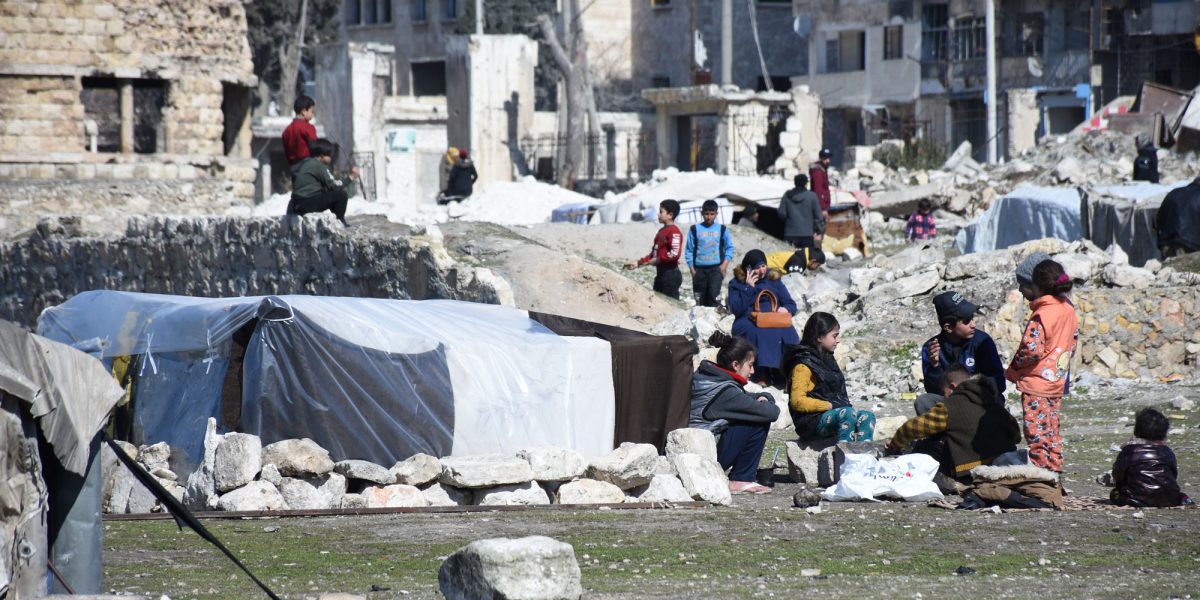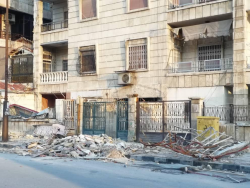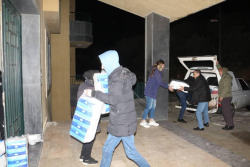Supporting communities in Syria after devastating earthquakes
28 February 2023|Chloe Gunther

The 7.8 magnitude earthquake and the following aftershocks in southern Turkey and northwest Syria have taken the lives of over 47,000 people.
Northwest Syria was home to millions of Syrian people who were already displaced from their homes due to violence from Syria’s civil war in other regions of the country. 5,800 people here have died and that number is expected to rise in the coming weeks.
For this month’s Insider, we spoke with Carmen Moreno, JRS Middle East and North Africa’s Director of Communications and Advocacy, to discuss the circumstances in Syria that precipitated the earthquakes and how volunteers at the JRS centers in Syria are responding to the emergency.
Before the earthquake, Syria was experiencing shortages in food, medicine, electricity, and fuel. The economy was nearing collapse and inflation skyrocketed. Ms. Moreno said that rates of hunger and malnutrition were incredibly high.
 Children often feel the impact of this economic situation the hardest as they have to drop out of school and enter the workforce to support their families. Child labor and child marriages and prevalent issues in the country, threatening the future of the next generation.
Children often feel the impact of this economic situation the hardest as they have to drop out of school and enter the workforce to support their families. Child labor and child marriages and prevalent issues in the country, threatening the future of the next generation.
Syria has been experiencing an unprecedented fuel shortage since December of last year and the ramifications have been deadly. Ms. Moreno explained that the lack of fuel and electricity has forced people to burn whatever they can, often releasing toxins into the air. The United Nations and other humanitarian efforts to help people in the country have stalled as they have been forced to reduce their work hours and capacity for distributing aid packages.
This shortage is happening in the coldest month of Syria’s winter.
“We are talking about under zero degrees celsius in temperature during the night and it is raining. It is the worst moment of the year and the earthquakes came in the worst week or winter,” Ms. Moreno said.
Before the earthquake, people were gathering in rooms, huddling to preserve heat.
“They are huddling in the street now…they are terrified and do not want to sleep inside any buildings,” Ms. Moreno said. Those who have them sleep in their cars. But without fuel, they cannot turn the vehicles on to move to another location or provide any heat.
“People are at risk of hypothermia, especially children,” she said.
The building damage from the earthquake is happening on the heels of destruction caused by the war, especially in Aleppo. Bombs and strikes have compromised these structures causing them to collapse more easily when the earthquakes struck. Over a hundred aftershocks have shaken the region, causing further damage.
Ms. Moreno also explained that there are still land mines scattered in the ground and falling debris can easily activate these bombs and make them explode.
The situation is dire and demands support, aid, and attention. In the JRS  centers that were not as highly damaged, volunteers at JRS Syria set up as emergency shelters and are working tirelessly to provide blankets, hygiene kits, food, and water to those who are in need. Ms. Moreno said that the center in Damascus has already welcomed over a hundred people.
centers that were not as highly damaged, volunteers at JRS Syria set up as emergency shelters and are working tirelessly to provide blankets, hygiene kits, food, and water to those who are in need. Ms. Moreno said that the center in Damascus has already welcomed over a hundred people.
Mental health and psychosocial support are a core focus of these JRS centers as they understand how traumatic both the earthquake and the precipitating events are.
“These people were already affected by multiple traumas from the war and crisis…it’s like reviving that trauma, we’re living again the same emotions and memories. This is really traumatic.”
Right now, these mental health support programs take the form of recreational activities for children and programs that allow the community to express themselves and mitigate some mental health issues.
“We play with the children to try to get them distracted, to help them not think about what is happening, and to be able to get back to a daily routine.”
Doctors and medicine are scarce in the country, so JRS volunteers are also working quickly to help provide medical attention to those injured from the earthquake and falling debris by setting up health clinics. Ms. Moreno noted that children’s respiratory systems are at a particular risk as they continue to inhale toxic air.
In looking towards the future and helping Syria rebuild, Ms. Moreno said the key lies in consistent, long-term financial and program support.
“This is why advocacy is so important,” Ms. Moreno said.
“The international focus will shift very quickly. This country was forgotten before this earthquake.” Ms. Moreno said, and she fears that if the world forgets about Syria again, “the consequences will be way worse.”
The focus must be on building resilience and empowering the communities in Syria to ensure a sustainable outcome.



